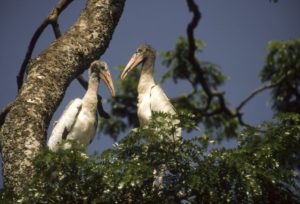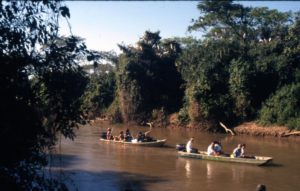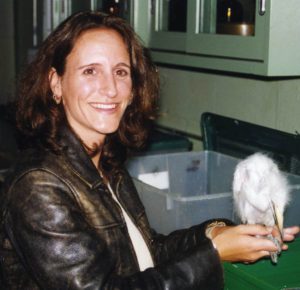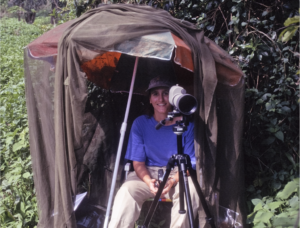At McKinsey.org, part of our mission and approach to problem solving is “developing, testing and scaling solutions”, so it’s no wonder that our President & CEO, Shannon Bouton, is a scientist herself. “Being a scientist defines how I tackle problems that I am presented with and has thus helped to shape how our organization seeks to find answers” Shannon told us, when we recently spoke with her about her background in science.
For International Day of Women and Girls in Science – we sat down with Shannon to learn more about her background in science, her accomplishments in Biology and why it’s important we close the gender gap in science.
Shannon’s unique background has taken her to some incredible places around the world, studying biology and ecology and most noteworthy the environmental impacts on birds and wildlife. Now Shannon is using her background in science to tackle issues like reimagining waste management systems to help tackle our global waste problem.
Q&A
Q: When and why did you first start getting interested in science? Was there a specific teacher, project or mentor you encountered along your way?
I lived in London from age 8 to 18 and went through the British school system. I gravitated early toward the sciences because I loved learning about the world and how it worked and eventually chose to do A’Levels in Chemistry, Physics and Biology. If I’m honest, part of my love for science came from two special teachers, Ms. Ross my physics teacher and Mrs. Mason my Chemistry teacher. I enjoyed their humor and the way they challenged me and my classmates to think for ourselves.
When I entered college, I decided to focus on Biology and Environmental Sustainability, because I was concerned about what I saw happening in our natural world. In grad school I found more strong women role models including my PhD advisor, Bobbi Low, who taught me to appreciate the fascinating complexities of animal behavior from birds to humans.
Q: Tell us about your journey and background in science, beginning with college and through your work post college as a professional.

I have B.S. with a double major in Biology and Environmental Science, a Master’s in wildlife, Ecology and Conservation, and a PhD in Natural Resources and the Environment. In between each degree, I worked on different projects that shaped my next step. After undergrad, I looked for a way to get myself to Brazil. I was born in Brazil, but only lived there for a few years and was eager to return after being raised as an expat. I wanted to understand what it meant to be Brazilian.
I got a job in Mato Grosso Brazil, working in the Brazilian Pantanal looking at whether we could use wading bird colonies as biological indicators of ecosystem health. That led me to my Masters work at the University of Florida, working with Dr.s Peter Frederick and John Ogden who had written about this same approach for the Everglades. During my degree I started looking at specific stressors including methyl mercury and tourist disturbance to understand the impact on wading birds.
After that, I went back to work in Brazil with a non-profit in the Pantanal, then applied to PhD programs to continue my work on stressors. My PhD work looked at the effects of multiple combined stressors on the development of nestling birds, this time in Cliff Swallows in Nebraska. I loved field work, but I didn’t want to be an academic – I thought I wanted to work for a conservation non-profit. Somewhere along the line, I got the idea that having an MBA would be helpful, so I joined McKinsey & Company after defending my dissertation to get the business training. There I helped to start the sustainability practice and now I am proud to be leading our efforts here at Mckinsey.org as we tackle some of the most complex environmental challenges.

Q: McKinsey.org is working on global complex challenges, specifically within circularity and building innovative waste management systems. Does your background in science play a role in how you approach these issues?
Absolutely. We take an experimental approach to many of the questions we tackle – comparing one solution against another to see which delivers the most impact. More than that, science has taught me how to disaggregate complex problems into small units that can be tackled without losing sight of the whole. Being a scientist defines how I tackle problems that I am presented with and has thus helped to shape how our organization seeks to find answers.
Q: What are some ways we can encourage women to embrace science early on? How important is representation in science?

Many studies of diversity and inclusion have shown that diverse teams are more creative, make better decisions, and draw more insightful conclusions. The same has been shown to be true in science, where having women on research teams often leads to new ideas and perspectives. Everyone approaches problem solving with their own biases. Ensuring the biases of a research team are not all the same, leads to more creative hypotheses, experimental approaches and thinking upfront and more robust interpretation of results.
Closing the gender gap has to start with keeping young girls excited about doing science. In middle school science, girls perform on par with boys and enroll in advanced science and math courses at equal rates. But then they move into high school, and there is a drop in girls participation. We need to find ways to encourage and excite girls who show promise or interest, looking at the ways we teach to make sure we are engaging them, and ensuring they don’t feel alone when they choose to pursue science in high school or college. I’m not an educator, but science applies to all aspects of life and it seems to me there are creative ways to make sure that textbooks, science classes and challenges are designed with the interests of teenage girls in mind.
My hope for the future is that we will have parity of women in all sciences across all levels of education. Quite simply, this leads to better science being done. The earliest signs of this will be a generation of teenage girls excited about pursuing careers in science leading to parity in the numbers of boys and girls doing science and math in high-school and beyond. We are getting closer but there is more work to do.
Q: What is your proudest accomplishment?

Both my Masters and PhD research, and most of the work I did in between, focused on understanding the effect of human disturbance on birds. I am particularly proud of my master’s work in the Brazilian Pantanal, where I worked with local fishermen, tour guides, cattle ranchers, and nonprofits to understand the economic benefits to the community of nesting colonies of wading birds (Wood Storks, Egrets, Spoonbills), and how to manage those biologically diverse sites so that the local people and tourists could benefit from them without disrupting the breeding birds. The final chapter of my thesis laid out in bullet form critical management recommendations for sustainable tourism in nesting colonies – not a usual format for a thesis chapter.
After graduation, I translated my thesis into Portuguese and took copies back to the communities where I had worked to share the insights hopeful of having some practical impact. But the real realization of the impact of my work came several years later when I visited a wading bird colony on a farm outside of Poconé in the Northern Pantanal as a tourist. Impressed by the sensitivity of our guides, the ranch “cowboys”, to not disturbing the birds we were viewing, I shared my pleasure with the farmer’s wife that evening at dinner. Proudly she told me about a set of guidelines she followed for how to manage tourism in nesting colonies, then pulled out a dog-eared copy of my thesis. It was the greatest validation I could hope for my work – to see it put into practice in a colony I had never before visited in a remote corner of the Pantanal. The State of Mato Grosso has since turned my thesis into a manual, distributed all over the region.
At McKinsey.org, there have been many accomplishments I’m proud of but most recently it was leveraging our programs to support the communities we work with during the COVID19 pandemic. Waste workers are essential workers so those in our programs have continued working through quarantines. To ensure the safety of workers, we gathered best practices from across the world to develop multiple trainings on how to safely operate waste management with an ongoing contagion threat. To date, we have trained 450 workers across our two locations, and provided support for four national ministries including the Ministry of Environment and Ministry of Village to share global health and safety best practices with over 600 waste management facilities across Indonesia.
In addition to access to PPE, we have supported waste workers and vulnerable communities in accessing food and health care. In Indonesia, we distributed over 4,000 meals to waste worker families along with full PPE provision and worked to ensure all of our workers are registered for national healthcare. In Argentina, we have provided tactical support to the local municipal government to distribute ~85,000 meals to residents in the informal settlement of Barrio 31. We have leveraged our communication channels, developed to drive recycling behavior, to help the government distribute health and safety information to residents of Barrio 31. And, we have been working with the local government, the International Red Cross (IRC) and Doctors Without Borders to establish a cohort of mobile diagnostic clinics across the Barrio to identify cases (e.g., taking temperatures of residents) and drive containment and quarantine efforts. The success of this last effort has led to the City of Buenos Aires to roll it out across all informal settlements in the city.
